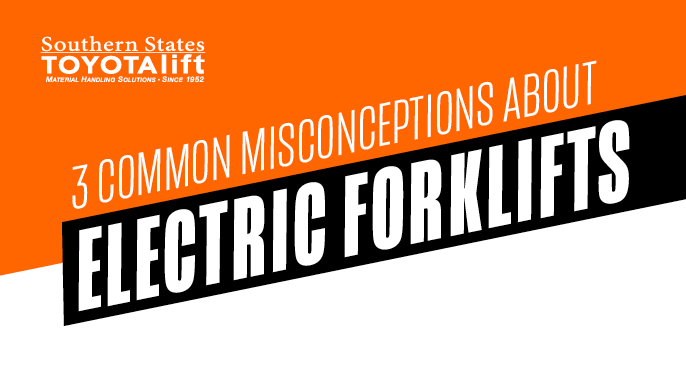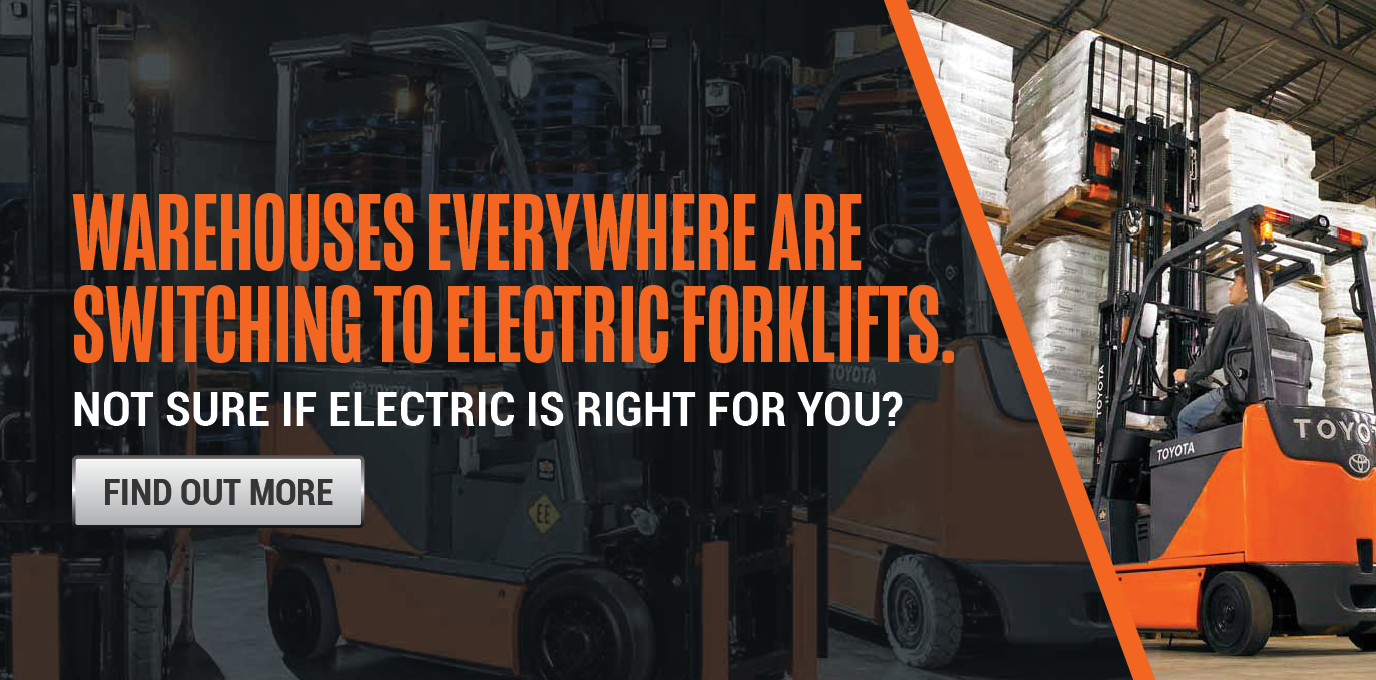3 Common Misconceptions About Electric Forklifts
by Rob Webb, on Aug 20, 2021 12:05:00 PM
 Are electric forklifts enough to handle your application? That’s the age-old question. Electric forklifts have no emissions and are better for the planet, but at what cost? If you’re cost conscious and comparing electric vs. LP, it can be hard to justify making the switch to electric without understanding everything that goes along with the switch.
Are electric forklifts enough to handle your application? That’s the age-old question. Electric forklifts have no emissions and are better for the planet, but at what cost? If you’re cost conscious and comparing electric vs. LP, it can be hard to justify making the switch to electric without understanding everything that goes along with the switch.
Besides, can electric forklifts even handle it? Don’t they have more downtime than IC models? They’re more expensive too, aren’t they?
These common misconceptions make the decision harder to make. It’s hard to decipher it all. What’s real and what’s not?
Let’s do some myth-busting.
Myth #1: Electric Forklifts are more expensive than internal combustion forklifts
In some situations, electric forklifts have a higher upfront cost than IC models. But this is far from the full story when it comes to cost.
Total Cost of Ownership (TCO) is made up of a few different factors. First is the initial cost. This is the easiest cost to see, but with machinery that can last five years or more, those first payments are just one small piece of the overall cost. Costs to maintain, reimbursement programs, and costs to operate help to tell the full story of TCO.
First, there are incentives in place to ease the initial cost of electric forklifts. Electric companies are eager to encourage the shift from IC to electric for many reasons, and there are programs in place to make it easy.
For Duke Energy customers:
Duke Energy offers the opportunity to apply for annual reimbursements for electric costs. This can help with the conversion from IC to electric. You may be eligible for a reimbursement of electric costs of up to $8k per vehicle depending on your situation.
For Georgia Power customers:
Georgia Power offers the Make Ready Electric Transportation Program, which can ease the upfront costs associated with switching from IC to electric. This program can help with the funding and installation of the infrastructure required to support electric charging facilities.
Electric forklifts have fewer moving parts in the engine than IC. This means fewer things can go wrong, there are no fluids to change, and maintenance is both less regular and less expensive.
On top of the lower maintenance costs, electric models are less expensive to operate than IC models. Electricity is cheaper and more predictable than gasoline. This makes budgets easier to project and to stick to than it is with IC models.
So, what’s the takeaway? Electric can be more expensive upfront but are much less expensive to own and operate. Does it balance out?
Even more than balance out, electric forklifts are cheaper over the lifetime of the machine. After the higher initial cost of electric forklifts, the savings in operating costs can pay off the difference in cost in as little as 2 years.
Once you hit this turning point, the electric is a less expensive option than IC throughout the remaining lifetime of the forklift. Ask a material handling consultant for a “convert to electric” savings estimate to see exactly how much you could be saving with an electric fleet.
Myth #2: The batteries won’t be charged in time, and time spent charging is downtime
If your forklift is down, you’re not getting anything done. When your application needs to run consecutive shifts, do electric forklifts need to charge between shifts? And can an electric forklift even make it through a full shift?
Single shift operations can charge their batteries overnight and have more than enough power for a full shift. This battery care routine can become a part of the shutdown process at the end of the shift each night. When it’s charged regularly, it keeps the lift running and operational with no downtime throughout the shift. Electric forklift batteries have more than enough charge to run a full shift.
But multiple-shift operations don’t have the luxury of overnight charging. On a multiple-shift operation, opportunity charging is a solution that will keep the lift up and running all day.
Opportunity charging is the practice of charging the battery for short periods throughout the day on breaks. This is instead of needing to charge the battery all at once. This solution keeps electric forklifts up and running throughout a multiple shift operation. Even when the battery doesn’t have the single charge capacity to keep the lift running throughout all the shifts. This practice prevents downtime, as charging on breaks throughout the day is enough to keep the lift operational all day long.
Myth #3: My application is too rough; electric can't handle it
Can electric forklifts handle all the applications that IC lifts can? Internal combustion forklifts have been the standard for toughness in this industry, but should they be?
Electric and IC forklifts are better suited to different applications. But the days when electric lifts couldn’t handle the toughest applications are in the past.
In some use cases, electric forklifts are actually a stronger option. Electric forklifts are the best option in cold applications because they start effortlessly anywhere.
Applications with lots of dust and dirt can choke IC lifts, but electric forklifts can operate smoothly and easily.
However, IC forklifts are likely better suited to remote applications where charging stations aren’t close by. When your application is far from a home base, it’s easier to bring an extra gasoline can than it is a backup battery.
While electric and IC models do have different strengths, electric can keep up with the toughest applications. Even in outdoor applications, electric forklifts can keep pace with the toughest IC models.
To get the full specifications of an electric forklift versus an IC model, Southern States Toyotalift is here to help. Contact us online, by phone at (866) 529-6953, or in person at one of our nine locations. We're happy to help you decide if an electric model is the right fit for your business.
FLORIDA
Jacksonville
Ocala
Orlando
Tampa
Winter Haven
GEORGIA
Albany
Macon
Columbus
Valdosta
Further Reading:
Toyota Rebates on Electric Forklift Trade-Ins
Are Lithium-Ion Forklift Batteries Right For Your Business?
3 Reasons Moving to Electric Will Re-Energize Your Business









